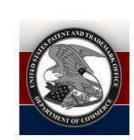Newsletter Issue 55 - September 2013
In this issue:
Government shutdown
Internet piracy
States respond to abusive patent enforcement
USPTO Will Remain Open During Possible Government Shutdown ...
For those who care -- i.e., inventors and trademark owners -- in
the event of a possible government shutdown, the United States
Patent and Trademark Office (USPTO) will remain open for business.
Here's what the USPTO says:
In the event of a general government shutdown on October 1, 2013,
the United States Patent and Trademark Office will remain open,
using prior year reserve fee collections to operate as usual for
approximately four weeks. We continue to assess our fee collections
compared to our operating requirements to determine how long we will
be able to operate in this capacity during a general government
shutdown. We will provide an update as more definitive information
becomes available.
Should a shutdown last longer that four weeks (OMG!), the USPTO will
run on a skeleton staff "to work to accept new applications and
maintain IT infrastructure, among other functions."
Six Strikes and Your Out (of Internet Access) ...
In February of this year, the Center For Copyright Information
(CCI) -- a group representing rights holders in the media industries
-- began a so-called "six-strikes"
educational campaign to combat Internet piracy. Leading Internet
Service Providers (ISP) -- Verizon, Time Warner, Cablevision,
Comcast and AT&T -- are taking part.
Here's how it works. When it knows of or suspects online infringing
conduct, a content provider will send an ISP a notice of copyright
infringement. The ISP will in turn forward the notice in the form of
an "alert" to the offending subscriber. These alerts are supposed to
be educational in nature. Any subscriber may receive up to six
notices after which the ISP may turn off his or her Internet
connectivity. An independent review process is available should a
customer believe it has been wrongfully targeted.
Not everyone likes this system. Infringers, of course, don't like it
but others would like to see an independent body to oversee the
system and not permit the ISP to "serve as judge, jury, and
executioner". The Electronic Frontier Foundation (EFF) is concerned
that the program will undermine efforts to promote free wi-fi since
the CCI states that "subscribers are responsible for making sure
their internet account is not used for copyright infringement" and
that the ISPs urge users to restrict access to their wi-fi
connections.
This seems designed to undermine the open wi-fi movement," said the EFF, referring to efforts to encourage users to share their wi-fi connections with others. It is suggested that free internet access can make locations more tourist-friendly and aid the emergency services. Open wireless is widely recognized to be tremendously beneficial to the public.
So what effect has the program had on online piracy rates? According to one blogger, absolutely no effect. In fact, piracy rates are still growing and traffic to one of the largest peer-to-peer piracy sites, Pirate Bay, has been trending higher. Another question is what effect the system would have on litigation against infringers by content providers. In one example, an adult film organization, which had sued a Verizon subscriber for allegedly infringing its x-rated film productions, subpoenaed Verizon for copies of six-strike notices received by the subscriber, information on how much bandwidth the subscriber used, and a list of viewed pay-per-view films he watched. Surprisingly, Verizon said "no" and the fight continued. We're not sure what the results were but it appears that the CCI program will become a litigation weapon despite the stated educational intent of the program. To date, our firm has not had the opportunity to view first hand the effects of the CCI program so if you have received a notice from your ISP, let us know. We would like to see it.
Abusive Patent Enforcement - The States Step Up
In general, only the Federal government and Federal courts have
jurisdiction over patent matters. However, the Federal government
does not have effective tools for protecting individuals and small
businesses from abusive and unjustified bullying by patent owners. A
small business often cannot afford to defend against a threat of
patent litigation and agrees to pay license fees, regardless of the
merit of the claim.
In the absence of Federal regulation, the states are filling the
gap.
The State of Vermont, of all places, is the pioneer. Vermont enacted
a new state consumer protection law to shield its citizens from bad
faith patent infringement claims. The Vermont attorney general
filed suit to enforce the new law against MPHJ Technology
Investments LLC, which claims to own patents to the technology of
scanning to e-mail. MPHJ sent letters to thousands of small
businesses, demanding licensing fees of $900 to $1200 per worker.
According to court filings by the Vermont attorney general, the
demand letters include several false statements and MPHJ allegedly
performed no investigation to determine whether the recipients of
the letters were infringing the patents. The litigation is ongoing.
Minnesota's attorney general subsequently extracted an
agreement from MPHJ not to send demand letters in that state
unless the letters are first approved by the Minnesota attorney
general. This result appears to be a complete victory for Minnesota.
Nebraska's attorney general followed the lead of Vermont and
Minnesota, but in a ham-fisted manner, without a targeted law and
without a defendant as unsympathetic as MPHJ. Nebraska's attorney
general took aim not MPHJ, but at its Texas-based lawyers, Farley
Daniels LLP. Farley Daniels sent out patent infringement demand
letters in Nebraska on behalf of a different client, Activision TV,
which manufactures and sells flat panel displays. The Nebraska
attorney general then sent a letter to Farley Daniels ordering the
law firm to stop patent enforcement in Nebraska
Farley Daniels promptly added the Nebraska attorney general as a
defendant in a pending Nebraska patent infringement lawsuit by
Activision TV. The Federal judge ruled that Farley Daniels could
continue to file and prosecute patent infringement cases in
Nebraska. The judge did not decide whether Farley Daniels could
continue to send cease-and-desist letters. The Nebraska attorney
general subsequently acknowledged that his complaint is not with
Activision TV, which appears to actually make and sell products.
Draft bills are under discussion in Congress to deal with the
issue of abusive patent enforcement. The draft bills would require
patent owners to present much more information to defendants in the
complaint. In a provision that risks throwing out the baby with the
bathwater, the draft bill requires that the losing party in patent
infringement litigation pay the attorneys fees of the prevailing
party. The legislation is being circulated for discussion, but is in
a very early stage.
.

